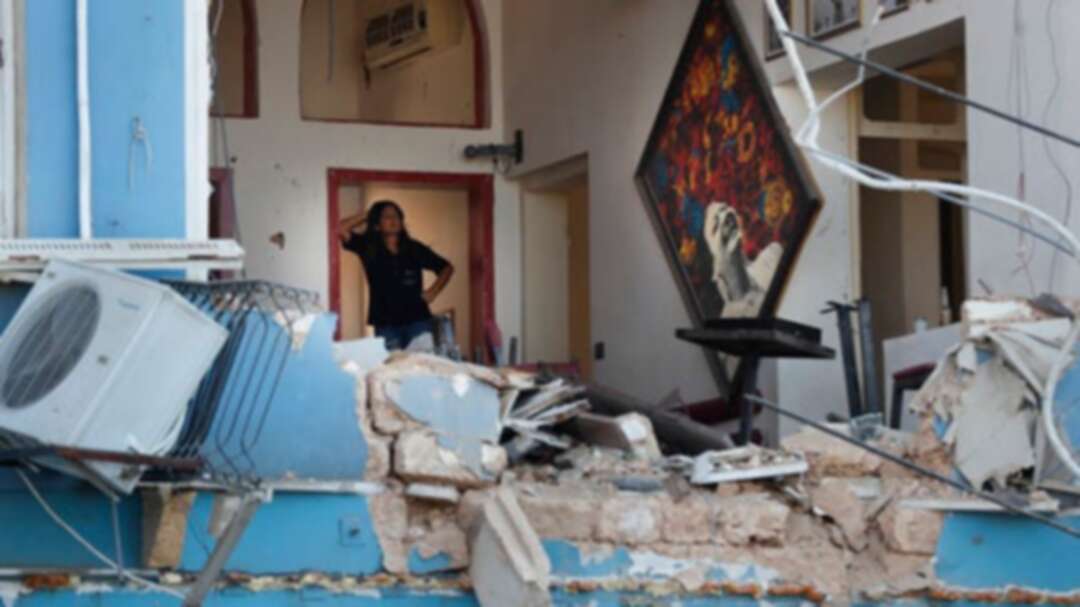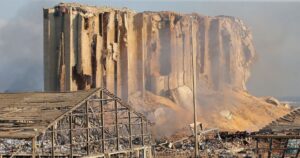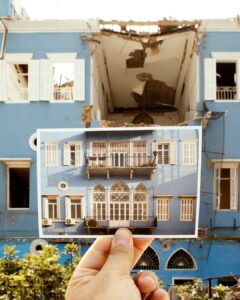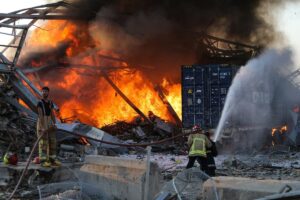-
Beirut port blast survivors still endure psychological toll

Joana Dagher lay unconscious and hemorrhaging under a pile of rubble in her apartment after the massive Beirut port blast in August, on the brink of death.
She survived because of the courage of her husband who got her out, the kindness of a stranger who transported her in his damaged car and the help of her sisters during the chaos at the overwhelmed hospital.
But Dagher doesn’t remember any of that: The 33-year-old mother of two lost her memory for two full months from the trauma she suffered in the explosion, including a cerebral contusion and brain lesions.
“I lost my life on August 4,” Dagher said. “I lost my house, I lost my memory, I lost two friends,” she added, referring to neighbors killed in the explosion. “I lost my mental health, and so I lost everything.”
The Beirut explosion, which killed more than 200 people and injured more than 6,000, caused wounds on an even wider scale on the mental health of those who lived through it.
Dagher is gradually regaining her memory. But another kind of pain lingers.
“The past 6 months have been a purgatory,” Jihane said. “When you see someone you love suffer so much, everyone suffers with them, you are helpless.”
The blast was caused by a fire that ignited nearly 3,000 tons of ammonium nitrate stored in a port warehouse. One of the biggest non-nuclear explosions ever recorded, the force tore through the city, sending people flying across rooms and slicing them with flying glass.
Even in a country that has seen many wars and bombings, never had so many people — tens of thousands — directly experienced the same traumatizing event at the same time.
 A general view shows the damage at the site of Tuesday's blast in Beirut's port area, Lebanon August 5, 2020. (Reuters)
A general view shows the damage at the site of Tuesday's blast in Beirut's port area, Lebanon August 5, 2020. (Reuters)“There are very high levels of anxiety and worry across the population,” said Mia Atwi, psychologist and president of Embrace, an organization working on mental health awareness and support. “There is a low mood bordering on clinical depression for the majority of the population.”
Demand for therapists has ballooned, making it hard to find treatment, especially since many qualified experts are leaving the country.
Embrace expanded its clinic after the explosion and still it has a 60-person-long waiting list. It has provided support for 750 people since the blast. Most are experiencing post-explosion symptoms, depression and anxiety, Atwi said. On Embrace’s helpline, 67 percent of the phone calls since August are from people in emotional distress, and 28 percent had suicidal thoughts.
The blast left mental wounds even in those it didn’t wound physically.
 The “Bouyout Beirut” (Houses of Beirut) postcard series juxtaposes buildings that were damaged in the Beirut port explosion on Aug. 4 with an image taken before the blast that rocked the Lebanese capital. (Supplied)
The “Bouyout Beirut” (Houses of Beirut) postcard series juxtaposes buildings that were damaged in the Beirut port explosion on Aug. 4 with an image taken before the blast that rocked the Lebanese capital. (Supplied)Najla Fadel, 33, was miraculously unscratched when the blast shattered the glass windows of her house, badly injuring her child’s babysitter. In the last months of her pregnancy with her second child, Fadel transported the bleeding woman to the hospital by herself.
She has since struggled with nightmares. She often wakes up, heart pounding, thinking the explosion has happened again.
“I jump at any sound and start looking for shelter,” she says.
The worst, she said, are thunderstorms and the sound of the Israeli warplanes that regularly violate and fly low through Lebanon’s airspace.
“A few nights ago, when planes were roaming above Beirut, I slept in the corridor,” she said. “This way I am halfway from my kids’ room, I can grab them faster and run just in case.”
Fadel saw a therapist for a while. Many others don’t get help.
“There are a lot of people neglecting their mental health or don’t know what to do,” said Souraya Frem, president and co-founder of Cenacle De Lumiere, an organization that after the explosion began offering free mental health support in Beirut.
 Firefighters douse a blaze at the scene of an explosion at the port of Lebanon's capital Beirut on August 4, 2020. (AFP)
Firefighters douse a blaze at the scene of an explosion at the port of Lebanon's capital Beirut on August 4, 2020. (AFP)“People are struggling with poverty, how to make ends meet and so they don’t see mental health as a priority,” Frem said.
From Perth, Australia, where she moved after the blast, Sarah Copland said she has been seeing two therapists to cope with her loss.
In the explosion, a shard of glass tore through the tiny chest of her 2-year-old son, Isaac, ending his short life. That day, she said, her life came to a standstill.
“My last image of my little boy is something a mother should never see,” she said. “That comes into my mind when I least expect it — we are going to do something, and it comes. It is very distressing.”
At the time, Copland was employed by the UN in Beirut. Thousands of miles from Lebanon, the memory haunts her.
“The sight or sound of broken glass gives me anxiety,” she said. “Lying in bed at night I hear the wind against the windows and that really freaks me out. I freeze up because it reminds of the whishing sound as the explosion came through our windows.”
source: The Associated Press
Image source: AP
Levant
You May Also Like
Popular Posts
Caricature
BENEFIT Sponsors BuildHer...
- April 23, 2025
BENEFIT, the Kingdom’s innovator and leading company in Fintech and electronic financial transactions service, has sponsored the BuildHer CityHack 2025 Hackathon, a two-day event spearheaded by the College of Engineering and Technology at the Royal University for Women (RUW).
Aimed at secondary school students, the event brought together a distinguished group of academic professionals and technology experts to mentor and inspire young participants.
More than 100 high school students from across the Kingdom of Bahrain took part in the hackathon, which featured an intensive programme of training workshops and hands-on sessions. These activities were tailored to enhance participants’ critical thinking, collaborative problem-solving, and team-building capabilities, while also encouraging the development of practical and sustainable solutions to contemporary challenges using modern technological tools.
BENEFIT’s Chief Executive Mr. Abdulwahed AlJanahi, commented: “Our support for this educational hackathon reflects our long-term strategic vision to nurture the talents of emerging national youth and empower the next generation of accomplished female leaders in technology. By fostering creativity and innovation, we aim to contribute meaningfully to Bahrain’s comprehensive development goals and align with the aspirations outlined in the Kingdom’s Vision 2030—an ambition in which BENEFIT plays a central role.”
Professor Riyadh Yousif Hamzah, President of the Royal University for Women, commented: “This initiative reflects our commitment to advancing women in STEM fields. We're cultivating a generation of creative, solution-driven female leaders who will drive national development. Our partnership with BENEFIT exemplifies the powerful synergy between academia and private sector in supporting educational innovation.”
Hanan Abdulla Hasan, Senior Manager, PR & Communication at BENEFIT, said: “We are honoured to collaborate with RUW in supporting this remarkable technology-focused event. It highlights our commitment to social responsibility, and our ongoing efforts to enhance the digital and innovation capabilities of young Bahraini women and foster their ability to harness technological tools in the service of a smarter, more sustainable future.”
For his part, Dr. Humam ElAgha, Acting Dean of the College of Engineering and Technology at the University, said: “BuildHer CityHack 2025 embodies our hands-on approach to education. By tackling real-world problems through creative thinking and sustainable solutions, we're preparing women to thrive in the knowledge economy – a cornerstone of the University's vision.”
opinion
Report
ads
Newsletter
Subscribe to our mailing list to get the new updates!






















